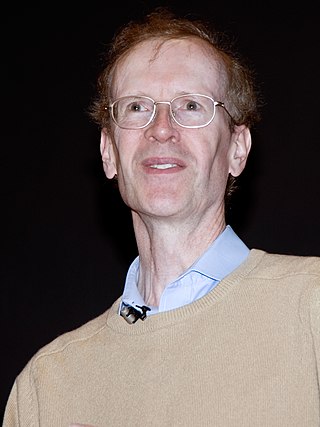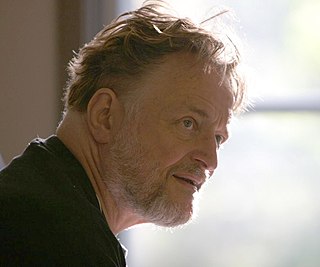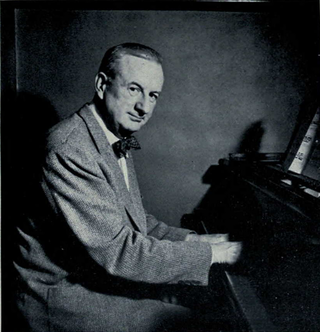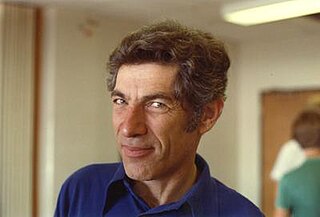
Sir Andrew John Wiles is an English mathematician and a Royal Society Research Professor at the University of Oxford, specialising in number theory. He is best known for proving Fermat's Last Theorem, for which he was awarded the 2016 Abel Prize and the 2017 Copley Medal by the Royal Society. He was appointed Knight Commander of the Order of the British Empire in 2000, and in 2018, was appointed the first Regius Professor of Mathematics at Oxford. Wiles is also a 1997 MacArthur Fellow.

John Horton Conway was an English mathematician active in the theory of finite groups, knot theory, number theory, combinatorial game theory and coding theory. He also made contributions to many branches of recreational mathematics, most notably the invention of the cellular automaton called the Game of Life.

Martin Gardner was an American popular mathematics and popular science writer with interests also encompassing scientific skepticism, micromagic, philosophy, religion, and literature – especially the writings of Lewis Carroll, L. Frank Baum, and G. K. Chesterton. He was also a leading authority on Lewis Carroll. The Annotated Alice, which incorporated the text of Carroll's two Alice books, was his most successful work and sold over a million copies. He had a lifelong interest in magic and illusion and in 1999, MAGIC magazine named him as one of the "100 Most Influential Magicians of the Twentieth Century". He was considered the doyen of American puzzlers. He was a prolific and versatile author, publishing more than 100 books.
The philosophy of mathematics is the branch of philosophy that studies the assumptions, foundations, and implications of mathematics. It aims to understand the nature and methods of mathematics, and find out the place of mathematics in people's lives. The logical and structural nature of mathematics makes this branch of philosophy broad and unique.

The Mathematical Association of America (MAA) is a professional society that focuses on mathematics accessible at the undergraduate level. Members include university, college, and high school teachers; graduate and undergraduate students; pure and applied mathematicians; computer scientists; statisticians; and many others in academia, government, business, and industry.

Harold Scott MacDonald "Donald" Coxeter was a British-Canadian geometer and mathematician. He is regarded as one of the greatest geometers of the 20th century.

Elwyn Ralph Berlekamp was a professor of mathematics and computer science at the University of California, Berkeley. Berlekamp was widely known for his work in computer science, coding theory and combinatorial game theory.

Richard Kenneth Guy was a British mathematician. He was a professor in the Department of Mathematics at the University of Calgary. He is known for his work in number theory, geometry, recreational mathematics, combinatorics, and graph theory. He is best known for co-authorship of Winning Ways for your Mathematical Plays and authorship of Unsolved Problems in Number Theory. He published more than 300 scholarly articles. Guy proposed the partially tongue-in-cheek "strong law of small numbers", which says there are not enough small integers available for the many tasks assigned to them – thus explaining many coincidences and patterns found among numerous cultures. For this paper he received the MAA Lester R. Ford Award.
Kenneth Jon Barwise was an American mathematician, philosopher and logician who proposed some fundamental revisions to the way that logic is understood and used.

Martin David Davis was an American mathematician and computer scientist who contributed to the fields of computability theory and mathematical logic. His work on Hilbert's tenth problem led to the MRDP theorem. He also advanced the Post–Turing model and co-developed the Davis–Putnam–Logemann–Loveland (DPLL) algorithm, which is foundational for Boolean satisfiability solvers.
Sal Restivo is a sociologist/anthropologist.
Philip J. Davis was an American academic applied mathematician.
The Chauvenet Prize is the highest award for mathematical expository writing. It consists of a prize of $1,000 and a certificate, and is awarded yearly by the Mathematical Association of America in recognition of an outstanding expository article on a mathematical topic. The prize is named in honor of William Chauvenet and was established through a gift from J. L. Coolidge in 1925. The Chauvenet Prize was the first award established by the Mathematical Association of America. A gift from MAA president Walter B. Ford in 1928 allowed the award to be given every 3 years instead of the originally planned 5 years.

Raymond Louis Wilder was an American mathematician, who specialized in topology and gradually acquired philosophical and anthropological interests.

Reuben Hersh was an American mathematician and academic, best known for his writings on the nature, practice, and social impact of mathematics. Although he was generally known as Reuben Hersh, late in life he sometimes used the name Reuben Laznovsky in recognition of his father's ancestral family name. His work challenges and complements mainstream philosophy of mathematics.
Thomas J. Jech is a mathematician specializing in set theory who was at Penn State for more than 25 years.
Samuel Karlin was an American mathematician at Stanford University in the late 20th century.
Nonstandard analysis and its offshoot, nonstandard calculus, have been criticized by several authors, notably Errett Bishop, Paul Halmos, and Alain Connes. These criticisms are analyzed below.
In a publishing career spanning 80 years (1930–2010), popular mathematics and science writer Martin Gardner (1914–2010) authored or edited over 100 books and countless articles, columns and reviews.
Elena Anne Corie Marchisotto is a mathematician, mathematics educator, and historian of mathematics. She is a professor emeritus of mathematics at California State University, Northridge.










